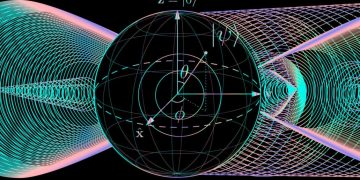Introduction
The advent of quantum computing represents a paradigm shift in the world of computation. While classical computers, which are based on binary logic (0s and 1s), have enabled significant advancements in technology, they are ultimately limited by the laws of classical physics. Some problems, especially those involving vast amounts of data and highly complex systems, are simply beyond the reach of these machines. Enter quantum computers—machines that leverage the strange, counterintuitive principles of quantum mechanics to perform computations far beyond the capabilities of traditional computers.
Quantum computing promises to revolutionize fields ranging from cryptography and materials science to artificial intelligence and medicine. But what makes quantum computers so powerful, and how do they solve problems that traditional computers cannot? This article delves into the potential of quantum computing, its principles, applications, challenges, and the future that lies ahead.
1. The Fundamentals of Quantum Computing
1.1. Understanding Quantum Mechanics
At the heart of quantum computing is quantum mechanics, a branch of physics that deals with the behavior of particles at the smallest scales. Unlike classical physics, which governs the macroscopic world, quantum mechanics is governed by principles that can seem strange, even paradoxical. The core concepts that enable quantum computing are:
- Superposition: In classical computing, a bit can be either 0 or 1. Quantum bits, or qubits, however, can exist in multiple states simultaneously due to superposition. This ability allows quantum computers to process multiple possibilities at once.
- Entanglement: This is a phenomenon where the state of one qubit is directly related to the state of another, even when they are far apart. Entanglement allows qubits to work together in ways classical bits cannot, creating a strong correlation between them that is key to the power of quantum algorithms.
- Interference: Quantum computers can manipulate the probability amplitudes of quantum states, allowing them to interfere with one another. This interference enables quantum computers to find the correct answer to a problem more efficiently by eliminating incorrect possibilities.
1.2. Qubits: The Building Blocks of Quantum Computation
Qubits are the fundamental units of quantum computers. Unlike classical bits, which are binary and exist in one of two possible states (0 or 1), qubits can represent 0, 1, or any quantum superposition of these states. This property significantly increases the computational power of quantum computers.
The advantage of qubits lies in their ability to perform parallel computation. Classical computers perform one calculation at a time, while quantum computers, thanks to superposition, can explore many potential solutions simultaneously. When quantum algorithms are designed effectively, this ability leads to an exponential increase in computational power for certain problems.
1.3. Quantum Gates and Quantum Circuits
Quantum computers use quantum gates to manipulate qubits. These gates perform operations like flipping a qubit’s state, entangling qubits, or altering the relative probability of the states. Quantum gates are similar to classical logic gates but operate based on the principles of quantum mechanics.
Quantum circuits are networks of quantum gates arranged to solve specific problems. Unlike traditional logic circuits, which are based on classical bits, quantum circuits manipulate qubits in ways that allow quantum computers to solve complex problems more efficiently.
2. The Promise of Quantum Computing
2.1. Speed and Efficiency Beyond Classical Computers
One of the most significant advantages of quantum computing is its ability to solve certain problems exponentially faster than classical computers. This is particularly important for tasks that require processing enormous amounts of data or solving highly complex mathematical problems. For example, classical computers struggle with tasks such as factoring large numbers, simulating complex molecules, and optimizing large networks. Quantum computers can perform these tasks in a fraction of the time.
2.2. Quantum Computing and Cryptography
One of the most widely discussed applications of quantum computing is its potential to break classical encryption methods. Classical encryption algorithms, such as RSA, rely on the difficulty of factoring large prime numbers as the foundation for security. However, quantum algorithms like Shor’s Algorithm could factor these numbers exponentially faster than classical algorithms, posing a threat to modern cryptographic systems.
On the flip side, quantum computing also promises the development of quantum encryption techniques. Quantum key distribution (QKD), for instance, uses quantum mechanics to create ultra-secure communication channels that are resistant to eavesdropping. This could potentially render current cryptographic protocols obsolete and usher in a new era of secure communication.
2.3. Optimization Problems
Optimization is a crucial area in many industries, such as logistics, finance, and manufacturing. Companies routinely face complex problems that involve finding the best solution among a large set of possibilities, such as determining the most efficient route for delivery trucks or optimizing supply chains. Classical computers, despite their power, can take a prohibitively long time to find the optimal solution for large-scale problems.
Quantum computers could significantly reduce the time required to solve these optimization problems. By using quantum algorithms, such as Grover’s Algorithm for unstructured search or Quantum Annealing, quantum computers can explore a vast number of solutions simultaneously, offering potential breakthroughs in optimization tasks.
2.4. Drug Discovery and Molecular Simulations
Simulating complex molecular structures is a challenging task for classical computers, especially when it comes to understanding the interactions between atoms and molecules. Quantum computers have the potential to revolutionize drug discovery by enabling the simulation of complex biological systems at a molecular level, something classical computers struggle with.
Quantum simulation could allow researchers to design new drugs more efficiently, speeding up the development of treatments for diseases such as cancer, Alzheimer’s, and more. This could also help in understanding complex chemical reactions, leading to breakthroughs in materials science and energy production.
2.5. Artificial Intelligence and Machine Learning
Quantum computing holds promise for advancing artificial intelligence (AI) and machine learning (ML). Quantum computers could significantly accelerate the training of machine learning models, enabling faster and more accurate predictions.
Quantum machine learning algorithms could potentially identify patterns in massive datasets more effectively than classical machine learning models. By leveraging quantum speedup, AI models could be trained on much larger datasets and solve problems that were previously computationally infeasible.

3. Real-World Applications of Quantum Computing
3.1. Financial Modeling
The financial industry relies heavily on complex modeling for risk assessment, investment strategies, and derivatives pricing. Quantum computing could provide exponential speedup in financial simulations, enabling faster predictions and more robust decision-making.
Quantum computing could be particularly useful in areas such as:
- Portfolio Optimization: Helping investors find the best mix of assets that minimizes risk while maximizing returns.
- Risk Analysis: More accurate models for financial risk can be generated using quantum simulations, helping businesses and financial institutions anticipate market fluctuations.
3.2. Supply Chain and Logistics
Managing supply chains is another area where quantum computing could make a significant impact. Quantum computers could solve optimization problems like determining the most efficient route for delivery trucks or optimizing inventory management.
By improving supply chain logistics, businesses can reduce costs, increase efficiency, and provide faster delivery to customers. Quantum algorithms could revolutionize industries such as retail, manufacturing, and transportation.
3.3. Climate Modeling
Quantum computers could assist in simulating complex climate models that are currently too difficult for classical computers to handle. These models could help scientists predict climate change with greater accuracy and develop more effective strategies for mitigating its effects.
By simulating atmospheric conditions, ocean currents, and ecosystems, quantum computing could provide valuable insights into environmental protection and sustainable energy solutions.
4. Challenges in Quantum Computing
4.1. Technical Challenges
While quantum computing promises enormous potential, several technical challenges need to be overcome before it can be fully realized:
- Error Rates: Qubits are highly susceptible to noise and errors due to their fragile quantum states. Ensuring error correction is vital for quantum computing’s practical application.
- Scalability: Building large-scale quantum computers with thousands or millions of qubits is a daunting challenge. Current quantum computers are relatively small, and scaling them to handle real-world problems is still a work in progress.
4.2. Quantum Decoherence
Quantum decoherence occurs when qubits lose their quantum properties due to interaction with the environment. This is a significant obstacle to quantum computing, as it prevents qubits from maintaining their states long enough to perform complex calculations. Researchers are exploring ways to mitigate decoherence, such as using quantum error correction techniques and improving quantum hardware.
4.3. Ethical and Security Concerns
The rise of quantum computing brings with it new ethical and security challenges. For instance, the potential for quantum computers to break current cryptographic systems raises concerns about privacy and data security. Governments and industries must work together to develop new cryptographic standards that can withstand the power of quantum attacks.
Furthermore, as quantum computing continues to advance, ethical concerns about its application in areas like AI, surveillance, and military use will need to be carefully considered.
5. The Future of Quantum Computing
5.1. Near-Term Developments
While large-scale, fault-tolerant quantum computers are still a long way off, there have been significant strides in quantum computing research. Companies like Google, IBM, and Rigetti Computing are making progress in building quantum processors, and quantum computing is starting to be applied to real-world problems in areas such as drug discovery, logistics, and finance.
5.2. The Role of Quantum Software
As quantum hardware continues to develop, so too does the need for quantum software. New quantum programming languages and development frameworks are emerging to enable programmers to write algorithms that can harness the power of quantum computers. Tools like Qiskit (IBM’s quantum software) and Cirq (from Google) are helping bridge the gap between quantum theory and practical application.
5.3. Quantum-Enhanced Technologies
In the coming decades, quantum computing could lead to a host of quantum-enhanced technologies, including quantum communication networks, quantum-enhanced sensing, and even quantum computing as a service (QCaaS). These innovations could unlock new possibilities in computing, telecommunications, and other industries.
Conclusion
Quantum computing holds immense potential to solve problems that classical computers cannot, from optimizing supply chains and accelerating drug discovery to revolutionizing cryptography and AI. Despite the challenges in hardware development, error correction, and scalability, quantum computing’s transformative power is undeniable.
The future of quantum computing is not just theoretical; it is already being realized through breakthroughs in research and early-stage applications. As we continue to advance in this field, the potential for quantum computers to address some of the world’s most pressing challenges becomes increasingly tangible. However, achieving this potential will require overcoming significant technical, ethical, and security hurdles, making the development of responsible, secure, and scalable quantum technologies paramount.
Quantum computing is poised to unlock a new era of possibilities, offering solutions to problems that have long been beyond our reach. The quantum revolution is just beginning, and the journey ahead promises to be as extraordinary as the technology itself.











































